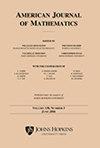高维Kakeya极大猜想的改进界
IF 1.7
1区 数学
Q1 MATHEMATICS
引用次数: 17
摘要
文摘:我们将Guth关于傅立叶限制问题的多项式划分论点应用到Kakeya问题的上下文中。通过将归纳论证写成递归算法,可以获得额外的多尺度几何信息。为了利用这一点,我们证明了方向分离管满足多项式Wolff公理的多尺度版本。总之,这给出了~$\Bbb{R}^n$中的Kakeya极大猜想的改进界,其中$n=5$或$n\ge 7$,以及无穷维序列的Kakeya集猜想的改进边界。本文章由计算机程序翻译,如有差异,请以英文原文为准。
Improved bounds for the Kakeya maximal conjecture in higher dimensions
abstract:We adapt Guth's polynomial partitioning argument for the Fourier restriction problem to the context of the Kakeya problem. By writing out the induction argument as a recursive algorithm, additional multiscale geometric information is made available. To take advantage of this, we prove that direction-separated tubes satisfy a multiscale version of the polynomial Wolff axioms. Altogether, this yields improved bounds for the Kakeya maximal conjecture in~$\Bbb{R}^n$ with $n=5$ or $n\ge 7$ and improved bounds for the Kakeya set conjecture for an infinite sequence of dimensions.
求助全文
通过发布文献求助,成功后即可免费获取论文全文。
去求助
来源期刊
CiteScore
3.20
自引率
0.00%
发文量
35
审稿时长
24 months
期刊介绍:
The oldest mathematics journal in the Western Hemisphere in continuous publication, the American Journal of Mathematics ranks as one of the most respected and celebrated journals in its field. Published since 1878, the Journal has earned its reputation by presenting pioneering mathematical papers. It does not specialize, but instead publishes articles of broad appeal covering the major areas of contemporary mathematics. The American Journal of Mathematics is used as a basic reference work in academic libraries, both in the United States and abroad.

 求助内容:
求助内容: 应助结果提醒方式:
应助结果提醒方式:


